Table of Contents
- This week's SEO and AI News- Episode 292 - Jun 26, 2023
- Perspectives are live everywhere now
- Significant SERP turbulence June 14, 2023
- Gary Illyes: Unless your content is utterly unique, it's pretty hard to get stuff indexed
- Google: “Write as long or short as needed for people who read your content”
- SEO Tips and News
- My new book is here! Creating helpful content
- AI
- Bard and the SGE
- ChatGPT & more AI news
- Local SEO
- SEO Jobs
- Subscriber content
This week's SEO and AI News- Episode 292 - Jun 26, 2023
 Perspectives live everywhere | June 14 SERP Turbulence | Google: It’s hard to get content indexed | Latest on Bard, the SGE and ChatGPT
Perspectives live everywhere | June 14 SERP Turbulence | Google: It’s hard to get content indexed | Latest on Bard, the SGE and ChatGPT
Last week’s episode (291) See all episodes Subscriber Content
This week, we’ll delve into Google’s recent turbulence and their recent random reminder on content length, as well as ponder the impact of medium quality content. I think it’s possible that having large amounts of mediocre content can cause a helpful content classification that weighs down your entire site.
In SEO news this week, Perspectives are live everywhere now (the filter, not the helpful content update), and there is loads of SERP turbulence starting June 14. Gary Illyes made a comment about how hard it is to get content indexed unless it is “utterly unique”.
In AI news, the EU has plans to regulate AI, Google’s VertexAI tools are now available and I’ve shared as much as I can on Bard, the SGE and ChatGPT.
In this episode
Important this week:
- Perspectives are live everywhere now
- Significant SERP turbulence June 14, 2023
- Gary Illyes: Unless your content is utterly unique, it’s pretty hard to get stuff indexed
- Google: “Write as long or short as needed for people who read your content”
- New Top stories feature/test looks similar to SGE
- Could your medium quality content be causing a helpful content system suppression?
- GA4 deadline is July 1. Are you ready?
- Other interesting news
- Latest Bard and SGE news and screenshots
- ChatGPT tips and news
- Using Bard for local searches (&ChatGPT for gardening)
- Use ChatGPT to rewrite descriptions on business profiles that won’t index
- More interesting AI news
- Weird thing where “local guide program” is a common keyword in GSC
- SAB’s should not hide their address
- Can you change the review snippets Google highlights in your GBP?
- I noticed a pattern with the dates of helpful content updates
- How to get your business found on ChatGPT
- Another “how I did this” thread by Tony Hill
- Playing around with using Bard, ChatGPT with web browsing, Perplexity and Bing for surfacing and summarizing recent AI news for newsletter.
See all subscriber PDFs.
Don’t want to subscribe? You’ll still learn lots each week in newsletter. Sign up here so I can send you an email each week when it’s ready:
Perspectives are live everywhere now
Last month at #GoogleIO we shared updates we’re making to Search to help you find and explore diverse perspectives from experts and everyday people. Today you'll be able to try it out. Learn more ↓ https://t.co/gxByfy128P
— Google (@Google) June 23, 2023
If you thought Google already released the Perspectives filter, you are right! It is now fully launched.
It's formally launched for mobile web and the Google App on iOS and Android. It wasn't fully launched before.
— Google SearchLiaison (@searchliaison) June 23, 2023
Google’s blog post talks about two things:
1) A perspectives filter that users can tap on
2) An update to the helpful content system to more deeply understand content created from a personal or expert point of view, allowing us to rank more of this useful information on Search.
The second has not launched yet. What Google was announcing was the Perspectives filter. We saw this before, although perhaps it was just in the US and is more global now?
I could not get the Perspectives filter to appear for me yet. Glenn Gabe was able to get it to appear in the SGE. If you tap on the bubble that says, “Perspectives”, you’ll see content that demonstrates experience – in this case – Youtube and Reddit content.
Update: When Perspectives first launched on 6/12, I noted it was NOT present via SGE. Now that Google just officially announced that Perspectives is live, IT IS triggering via SGE. Just a heads-up for those keeping track of SGE and how things are evolving. 🙂 pic.twitter.com/16omlzK3B9
— Glenn Gabe (@glenngabe) June 23, 2023
Significant SERP turbulence June 14, 2023
Here’s the SER article where Barry gathers a bunch of community talk about a possible unannounced update on this day. There are quite a few comments including:
- Huge drop today
- Different niches, but the impacts of updates are very similar. USA is my biggest audience, here too -30% drop.
- Really wild ups and downs this past week, low to high 281% on weekdays!
On quick glance, I can see one site in my portfolio that is seeing whopping losses starting June 14. This site previously was impacted by the helpful content system and improved with March core. They were continuing to improve until being hit strongly this week. I haven’t investigated the details yet.
The Semrush sensor and other tracking tools are showing all sorts of ongoing changes with Google’s results.
![]()
Gary Illyes: Unless your content is utterly unique, it's pretty hard to get stuff indexed
This episode of Search Off the Record was all about indexing.
Some points I found interesting:
- [8:19] If your home page is not getting crawled and indexed, there’s probably a technical problem.
- [10:24] Sometimes indexing problems happen because someone on your team used the site removal tool.
- [11:52] Martin gives an example of a situation where hreflang is being misused because a page has essentially the same content across languages with perhaps just the price being different. Google will often canonicalize all of those versions into one making one or more of the language versions not indexed.
- [15:31] When an event happens and people are posting links to something everywhere on the internet, that sends signals to Google to index that page quickly. In other cases, like for example, if someone published their PhD thesis to the web and no one is interested in it, it may never get indexed.
- [17:39] John asked, “What if my content just isn’t being indexed as quickly as I want it to be?” “I’m pretty sure my blog post is the most unique take of all the blog posts out there, but I need to get it indexed today. Otherwise, nobody will look at it.” Gary’s response is that nobody will look at it anyway. “Unless you are publishing something utterly unique and something that people are actually interested in, it’s pretty hard to get stuff indexed.”
- [20:39] Gary says, “ if we see that people are continuously linking to you, and you are getting, for example, new links…and we know that you haven’t paid anything for those links because that’s a bad thing, John, and you should stop doing that, then we might be more interested in keeping your content in our index.
- [24:55] Gary says he wouldn’t use the site: command for much other than to look for certain keywords you wouldn’t want associated with your site.
Google: “Write as long or short as needed for people who read your content”
Google shared this random reminder with an interesting hashtag.
Reminder. The best word count needed to succeed in Google Search is … not a thing! It doesn't exist. Write as long or short as needed for people who read your content. That's aligned with what our ranking systems aim to reward: https://t.co/NaRQqb1SQx #PeopleNotRobots pic.twitter.com/wdjhHn9RR3
— Google SearchLiaison (@searchliaison) June 22, 2023
I used the ChatGPT Meme Generator plugin to summarize the bulk of the replies I got when tweeting about this.
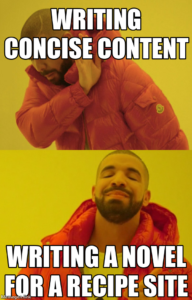
Why did Google tweet this now? It’s unlikely to be just a random reminder. Given the hashtag Danny used, #PeopleNotRobots, I expect Google is gearing us up for changes to the helpful content system.
SEO Tips and News
New Top stories feature/test looks similar to SGE
Valentin Pletzer shared some screenshots of an interesting top stories SERP. It looks a little bit like the SGE.

There are new ways to use Chrome on iOS. You can now see addresses on a map by tapping on it in Chrome, create calendar events, get better translations and, probably the biggest change, search with Google Lens.
Could your medium quality content be causing a helpful content system suppression?
Look at how Google describes to the quality raters how to rate the quality of content. Many of the sites that I have analyzed that I suspect have been impacted by Google’s helpful content system have copious amounts of “medium” level content…pages have a beneficial purpose and they achieve that purpose, but they’re not the absolute best.

As I wrote in my new book on the helpful content system, many sites are facing a difficult and near impossible decision on what to do with this content.
A common scenario is for a business to hire an SEO company to create copious amounts of blog content for them. But why? We’d like to tell ourselves that we’re creating this content to help our customers. But such much of the content that is written for blogs is simply there to provide words to search engines and opportunities for links.
If you’ve been impacted by the helpful content system, look at what Google says in their documentation:
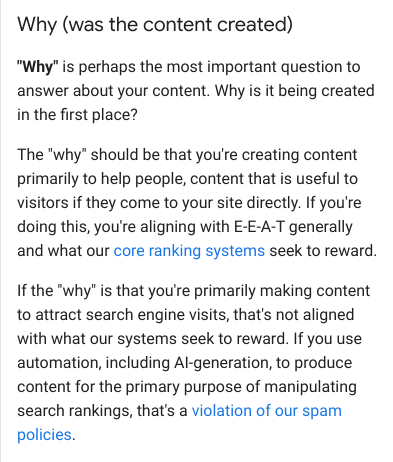
If you’re primarily creating content to attract search engine visits, that’s not aligned with what Google seeks to reward.
I am fairly certain that many sites that have benefited for years from producing lots of “medium” quality content, are now suffering with the weight of an (un)helpful content classification holding them down.
But what should they do?
I think they should get rid of any content that was created for the purpose of SEO…any content whose audience is more likely to be searchers interested in a topic rather than legitimately potential customers.
But, this is a big ask, especially considering:
- There is no way to prove the helpful content system is impacting them (although in often there is a lot of evidence to put together a good case.)
- There is no way to definitively know what the problem is, other than a vague, “your content is generally not as helpful.”
- There is no way to know whether it’s worth spending the extensive time and effort needed to improve content quality to possibly get the helpful content classification lifted.
- To get that classification lifted or at least weighted less heavily, Google’s algorithms need to see not only that you’ve improved, but that you’ve been that way for a few months.
- There are no legitimate solid case studies of helpful content recoveries. There are stories of sites working to improve and then eventually seeing a lift with a known or suspected helpful content update. These probably are recoveries! But business owners are going to want to know that if they put money and effort into extensive quality improvements that there is some good evidence it will be worthwhile.
- Businesses impacted by the helpful content system are often struggling with significantly reduced revenue. Quality improvements can require significant expense such as hiring experts, completely redesigning a site, equipping your writers to do original reporting, and consistently creating the type of content that is good enough for Google to consider it high quality rather than medium.
- There are so many changes on the horizon in terms of AI that are unknown. I think that working to improve in the eyes of the helpful content system will be work that helps you in the age of language model driven search as well, but who knows what will happen to this business as the SGE, Bard, PaLM API, etc. advance?
For sites impacted by the helpful content system, there is a lot of general guidance from Google, but very little specific guidance that says, “If you do this” you are likely to recover your lost traffic. I think that in many cases, this may be because recovery would be quite difficult.
GA4 deadline is July 1. Are you ready?
I am afraid for the mass confusion we will possibly soon see. I’ve been advised to say “no” when Google suggests making a GA4 profile because they’ll mess it up. But then, others are saying that yes we should. And very few can understand how to get the data you want from it.
I found this article from Ammon Johns 9 years ago interesting. It talks about how Google Analytics is good for gathering data, but then we have to build all sorts of complex solutions to know what to do with it.
#GA4 is a good thing… No, hear me out. Analytics should NEVER be something you just install. It is something you think about and develop. This is what I was talking about 9 years ago: https://t.co/lvv2fdFd3B
— Ammon Johns♞ (@Ammon_Johns) June 20, 2023
I believe GA4 was built to allow us to do things with data, rather than just report on data. We have to build all sorts of customized reports and use many tools to answer the specific questions our clients have about how their businesses are performing.
If GA4 is eventually connected to Bard, I expect we could ask any question, like, “Did my traffic decline in conjunction with a Google update?” or, “Which social media posts sent me the most converting visitors this week?” You could then brainstorm with Bard on how to investigate further and what to do.
With generative AI we might be able to ask for a chart or image to demonstrate this info.
One day we’ll look back at the way we do analytics and reporting today and think it is archaic.
Other interesting news
The new Core Web Vital, Interaction to Next Paint (INP) will be added to the core web vitals report soon. It is not a factor in search until March of 2024.
Youtube is going to release a tool to help us A/B test thumbnails.
I've been working hard on Google Discover audits for the past few months 😅
One important takeaway: understanding the general demographic of Android users can teach you a lot about what content will resonate in Google Discover
Source: https://t.co/UwQ2V7JndL pic.twitter.com/ExeFk3YE58
— Lily Ray 😏 (@lilyraynyc) June 22, 2023
📌 Entities can also have relationships with other entities.
📌 These relationships allow for data to be retrieved in different ways.
📌 Entities can be either physical objects such as products or customers, or they can be abstract such as orders or invoices.— Dixon Jones (@Dixon_Jones) June 19, 2023
Google Merchant Center had issues with timeouts, 404 and other crawl issues.
How to use PageSpeed Insights by Patrick Stox
Quick and easy way to cluster keywords in a vertical or niche that you're not familiar with:
1/ Google the brand
2/ Throw the topics SGE points out into Semrush's clustering tool
3/ Filter out the noise
4/ Write AI draft
5/ Send to experts to finish the content pic.twitter.com/RmMKm33FZT— Kevin_Indig (@Kevin_Indig) June 21, 2023
Didn't notice it before but it seems the term "everyday expertise" was completely scrubbed from Google's Quality Rater Guidelines in the last update.
Looks like they retired it in favor of just "life experience." pic.twitter.com/Hx20q6Do6K
— Blair MacGregor (@blairmacgregor) June 22, 2023
Why creator-led content marketing is the future of search by Ashley Liddell on Search Engine Land
USA Today owner, Gannett suing Google
Gannett, the largest newspaper publisher in the U.S., has filed a lawsuit against Google and its parent company Alphabet Inc. for alleged anti-competition tactics in digital advertising.
Gannett claims that Google is rigging the ad sales system on publisher websites. The allegation centers around real-time ad sales, which occur in the milliseconds it takes for a webpage to load. Gannett alleges that, given Google’s control of 90% of the publisher ad server market and 60% of the ad exchange market, the tech giant can manipulate the real-time process of selling ads.
Google has refuted these allegations, stating that publishers have many options for monetizing with advertising technology. Google Ads Vice President Dan Taylor said that Gannett itself uses dozens of competing ad services, including Google Ad Manager. He also stated that publishers keep the majority of the revenue when they use Google’s tools, and he expressed confidence that the court will see how Google’s advertising products benefit publishers and help them fund their online content.
This lawsuit against Google is not the first of its kind. Google is also the focus of similar lawsuits from the European Union, the Department of Justice, and a coalition of Attorneys Generals from ten states, all of which also allege anti-competitive practices in Google’s advertising operations.
My new book is here! Creating helpful content
This book is very similar to my quality raters’ guidelines handbook that I wrote years ago and have published several revisions of. Its focus is to help you understand the helpful content system. It walks you through understanding the examples in the QRG.

The book is a combination of learning about how Google uses AI systems like the helpful content system. Then, it ends with several checklists and exercises you can work through to improve your content so that it best aligns with Google’s guidance on creating helpful, relevant content.
If this is all confusing, things should make more sense when I publish the article that goes along with this book. Very soon!
Click here to read more about the helpful content workbook.
AI
Bard and the SGE
Kenichi Suzuki tweeted that Gary Illyes said at Search Central Live that Bard will be in the experimental stage for a few more months or a quarter.
Bard will be in the experimental stage for a few more months or a quarter. Interesting features will come. #SearchCentralLive@methode
— Kenichi Suzuki💫鈴木謙一 (@suzukik) June 16, 2023
This slide was interesting. Google has machine learning algorithms and signals that are trained on content for humans. This is the helpful content system:
ML based ranking algorithms and signals are trained on content by humans for humans.
They "understand" and promote natural content better.
#SearchCentralLive@methode pic.twitter.com/jNsPIZ5vGa— Kenichi Suzuki💫鈴木謙一 (@suzukik) June 16, 2023
An LLM is a type of Al algorithm that uses deep learning techniques on massively large data sets to understand, summarize, generate and predict new content.#SearchCentralLive@me pic.twitter.com/4mpkDMmZdn
— Kenichi Suzuki💫鈴木謙一 (@suzukik) June 16, 2023
When it comes to AI, quality is more important than how content is created. #SearchCentralLive
via Cherry— Kenichi Suzuki💫鈴木謙一 (@suzukik) June 16, 2023
Q. Does Google annotate AI-generated content (internally)?
A. No. It doesn't matter who created the content, but the quality of the content does. #SearchCentralLive @methode— Kenichi Suzuki💫鈴木謙一 (@suzukik) June 16, 2023
The SGE
I don’t have as many SGE examples as I would like as I can’t get it to pop up for me! If I get it back I’m going to be sure to engage with it more…perhaps it doesn’t like me because I am doing so many searches, taking a screenshot, and not giving Google any useful engagement data.
Lily Ray asked the SGE what kind of dog she has and it was vaguely close. Marcy is actually a 6 year old Australian Shepherd.
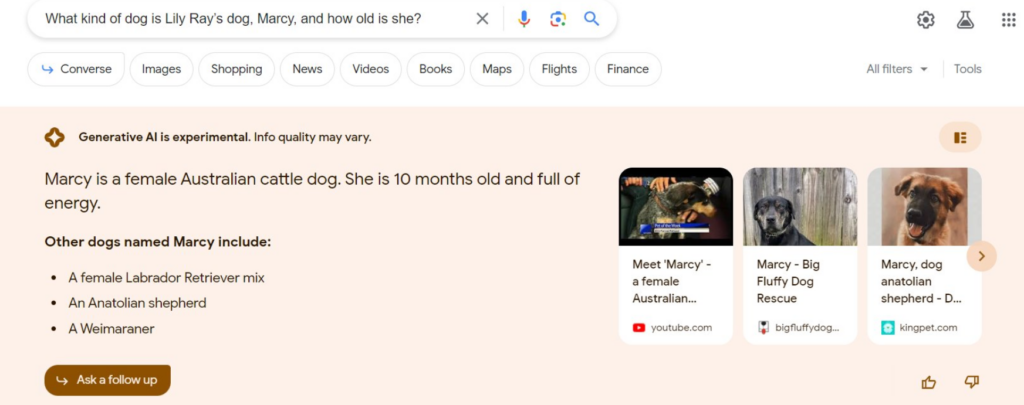
I would love to know where the SGE gleaned this information from. A Google search clearly shows me the right answer, from Lily’s site.
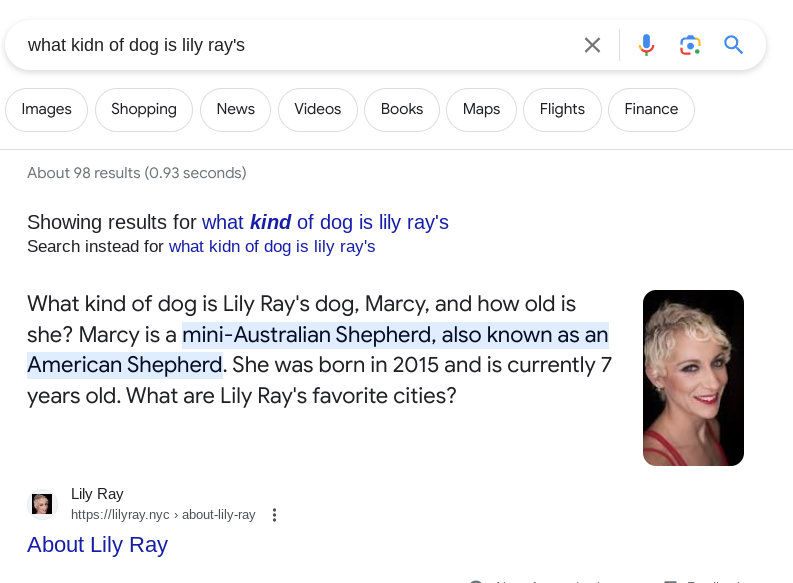
And Bard could not answer the question.
Here’s another example, shared by Grégory Florin of the SGE completely copying a website verbatim without linking to it or referencing it.

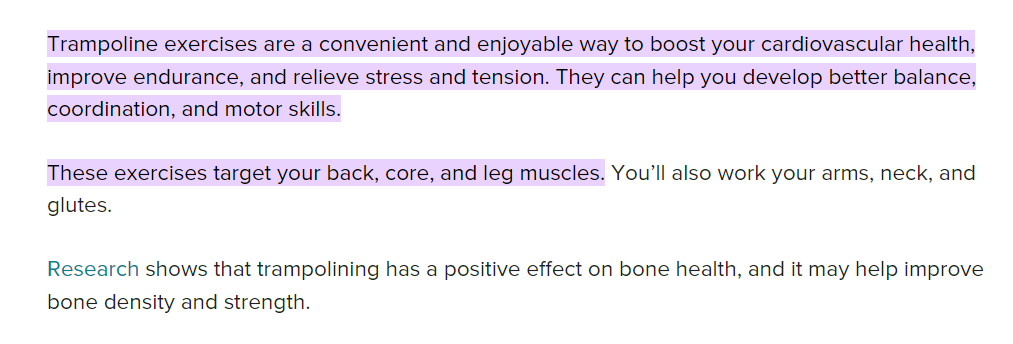
I’ve mentioned this before, but I have a suspicion that when the SGE goes live, the text we see will not be stitched together from websites, but Bard generated and much less likely to be a direct quote. We will see!
Miriam Ellis is seeing the SGE pull in a lot of information from LinkedIn.
Jeannie Hill shared these screenshots of the SGE showing information on a recent news query.
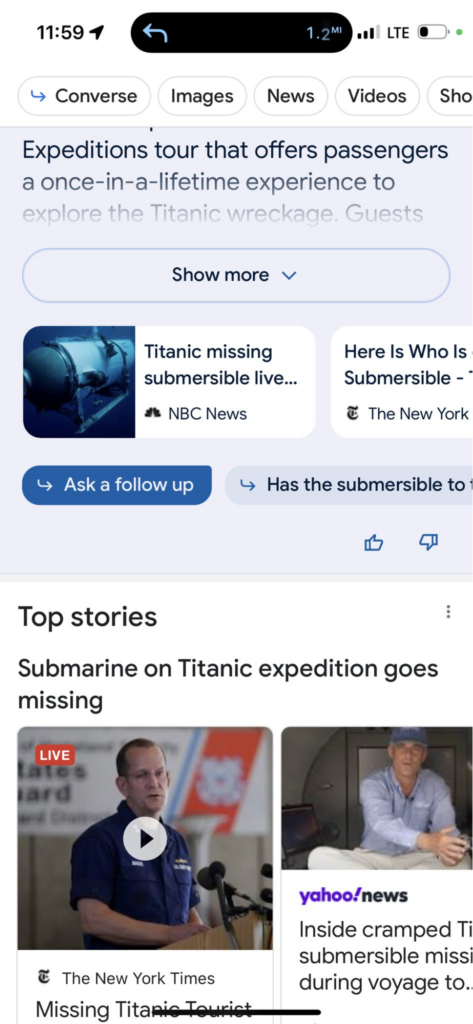
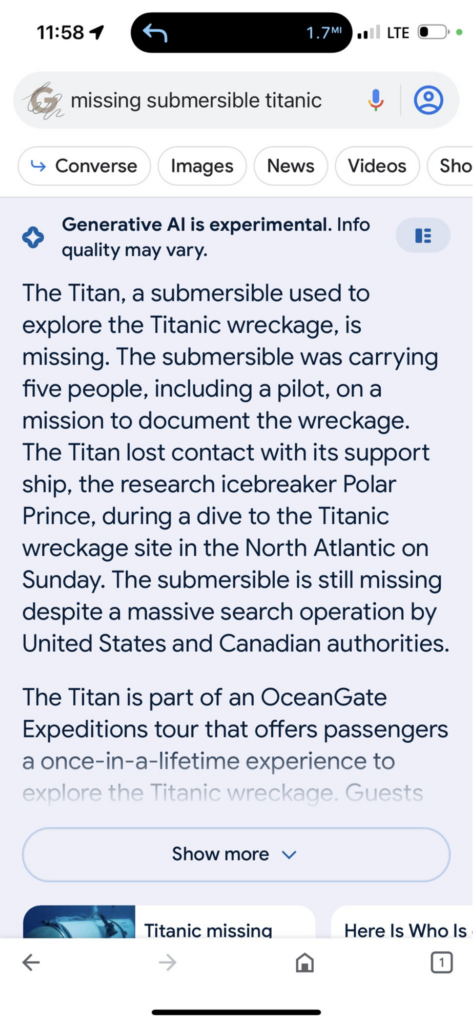
Mark Alves found the SGE gave more useful information than regular search when searching for the location of the Apple store in a mall.
ChatGPT & more AI news
Lily Ray found a super helpful way to use ChatGPT for SEO.
Wow. I think this might be one of the coolest SEO applications for ChatGPT I've found so far.
Turn on the plugin Link Reader. Ask it to generate a specific type of Schema for you based just on the URL and the content on the page.
And voila, it instantly works. And validates. pic.twitter.com/KMa35RwJqT
— Lily Ray 😏 (@lilyraynyc) June 23, 2023
There is an OpenAI discussion community. It’s mostly developer talk, but I found some interesting conversations about prompting here.
Gmail help me write is available for some. You can tap a button to have AI write a draft for your email. It’s like Smart Compose but will write full paragraphs and also shorten or expand them for you.
GoogleドキュメントにAIライティングの機能が付いた🤖✒️https://t.co/ZuWjab2G9L pic.twitter.com/6FAcsKM5HC
— Kenichi Suzuki💫鈴木謙一 (@suzukik) June 19, 2023
The write-it-for-me Button has come to gmail (or at least to beta testers). It is now easier to just have AI write email for you than to do it yourself.
I don’t think we are ready for what this means, as I discovered when The Button came to Google Docs. https://t.co/keo9x67FfX pic.twitter.com/BsvNmhMcpX
— Ethan Mollick (@emollick) June 17, 2023
Gary Illyes from Google said on LinkedIn, “LLMs have a very high wow factor, but they have no clue about your website; don’t use them for diagnosing potential issues with it.” He says we should use LLMs at our own risk and be picky about what we accept from its output.
Google’s SoundStorm is a new AI tool that makes creating sounds quicker by doing many steps at once. It still makes great quality sounds and keeps the voice and noise conditions steady. When used with another tool called SPEAR-TTS, it can create realistic conversations, letting you control what is being said and in what voice.
The audio in this conversation is all AI generated:
Also, check out this example of how SoundStorm can synthesize high-quality, natural dialogues: https://t.co/vYX5GZ2fJE pic.twitter.com/AkWSLFTSu7
— Google AI (@GoogleAI) June 23, 2023
Recommended watch. I know I say this a lot, but this was one of the most interesting videos I’ve seen in a long time.
Playing around with using Bard and ChatGPT to help me curate the news
Using voice recorder + ChatGPT
In the Subscriber content, you can read some of the prompts and thought process I used in exploring with using Bard, ChatGPT with web browsing, Bing and Perplexity to help me find and write content for newsletter. I shared a bunch of screenshots showing how the web crawling with ChatGPT is getting its answers. This was super interesting. My goal here was not necessarily to change the way I find news, or create an app, but rather to continue to explore ways we can use AI to help us. Learning how to work with LLM’s is a skill we need to practice and learn. I’d encourage you to find ways to use these tools to assist you as soon the world will be reaching out for people who understand how AI chat works.
Use ChatGPT to rewrite descriptions on business profiles that won’t index
I've been using ChatGPT to expand descriptions on business profiles that won't index on Google. I simply copy the description, use "rewrite & expand" and GPT writes an original & unique description, then hit Omega Indexer. Working like a charm. #SEO @PubIndexAPI @brightlocal
— Doug Bradley (@EverestLawMktg) June 21, 2023
Using Bard for local searches (&ChatGPT for gardening)
Now that our garden is getting even bigger (I have no idea why we are doing this but it’s fun), David is playing around with making our own irrigation system. Every time I look out at the yard, he is on his phone brainstorming with ChatGPT. For example, we are growing peppers in pots. He asked ChatGPT if the pots could be touching each other and it told him about the importance of airflow and then suggested the optimal distance to separate them.
Here’s another search we recently did. We couldn’t find information on a particular pepper so we used the web browsing feature.
Using ChatGPT with web browsing to research the garden.
It had no info on these two varieties of peppers but web browsing did the trick. https://t.co/StxAbNsSbu pic.twitter.com/wH3a0ja51Y
— Dr. Marie Haynes🌱 (@Marie_Haynes) June 21, 2023
As I’m writing this newsletter, David just texted me saying he’s having a heck of a time finding the type of hose he’s looking for. My Google searches for “drip hosing for gardens near me” gave me results for big box stores that might carry drip hosing.
Bard gave me more specialized, smaller garden centres.

I don’t think Bard’s production ready when it comes to helping with local searches, but I expect they will continue to improve and eventually most if not all local searches could be Bard served.
Update: Funny story. David went to the second place Bard suggested. They did not have the hosing, but the expert there told him that one of the big box stores had what he was looking for. We spent our weekend filling pots with soil now that they have drip hosing in the bottom. My arms are so sore.

More interesting AI news
Generative AI support on Vertex AI is now generally available. If you are at all interested in developing with Google’s AI tools, this is a must read.
Facebook introduced Voicebox: The first generative AI model for speech to generalize across tasks with state of the art performance.
The EU has approved a draft law to regulate AI. This could be the blueprint the world follows. This law, expected to be approved by the end of the year, categorizes AI risks into four groups: unacceptable, high, limited, and minimal. Systems with ‘unacceptable risk’ will be banned, including AI used for ‘predictive policing’ and live street camera face recognition. ‘High risk’ AI systems will require registration and monitoring. The legislation aims to balance the protection of rights and values without hindering innovation. After approval, businesses in the EU will need to comply with it, possibly influencing AI research and business practices beyond Europe.
OpenAI, Google, Microsoft and Adobe are holding talks with various news organizations about potential licensing deals.
OpenAI’s CTO Says AI Will Be Your Daily Companion
There are now over 500 ChatGPT plugins. OpenAI is considering creating an app store for AI software.
Introducing MAGVIT, a single transformer designed to address ten video generation tasks, including future image animation, video editing and video outpainting. Stop by the #CVPR2023 Google booth at 10am today to see it in action! More details at: https://t.co/nd7Gew2ozv pic.twitter.com/8J35j5fnIG
— Google AI (@GoogleAI) June 21, 2023
Introducing RoboCat, a new AI model designed to operate multiple robots. 🤖
It learns to solve new tasks on different robotic arms with as few as 100 demonstrations – and improves skills from self-generated training data.
Find out more: https://t.co/9YmgKxmiGE pic.twitter.com/JEytQhjPMf
— Google DeepMind (@DeepMind) June 20, 2023
Facebook has invented the ChatGPT of Voice content generation called Voicebox.https://t.co/4PJ98IHvOe
— Mic King (@iPullRank) June 17, 2023
I watched the first 2.5 hours of this this weekend and can’t wait to finish it up. If you’ve got time, I’d recommend this as Marc Andreessen, the founder of Netscape and also a lot of other cool stuff we take for granted as we use the internet talks with great optimism about how AI will improve our lives.
Local SEO
There is a weird thing happening where people are noticing a query in GSC called, “local guide program” that often shows as driving a number of clicks.
Sterling Sky did a study that shows it’s not a good idea for service area businesses to hide their address.
Ben Fisher asked the GBP team if they could give us a notification dot for new GBP reviews. Looks like that is live.
So I suggested this to the GBP team a while ago.. and here it is!!! A red dot notification if you have new reviews.@rustybrick – New 🙂 pic.twitter.com/Smz3bWet6g
— Ben Fisher (@TheSocialDude) June 22, 2023
Seeing this interesting floating GBP structure today. Notice how the listing stays on top as the page is scrolled? Kinda cool. pic.twitter.com/KvkbyK2gWP
— Amy Toman 🐚🩴🐚 (@BubblesUp) June 20, 2023
Can you change the review snippets that Google highlights on your GBP?@mblumenthal believes that Google considers these factors when selecting a review to highlight:
🔸 length (longer)
🔸 relevance/quality
🔸 images
🔸 age (older)
🔸 rating1/2#localseo #seo pic.twitter.com/ybItVj9CBf
— Darren Shaw (@DarrenShaw_) June 19, 2023
On Moz: The Impact of Local Business Reviews on Consumer Behavior
SEO Jobs
Looking for a new SEO job? SEOjobs.com is a job board curated by real SEOs for SEOs. Take a look at five of the hottest SEO job listing this week (below) and sign up for the weekly job listing email only available at SEOjobs.com.
SEO Specialist ~ Bananas Agency ~ $48k-$54k ~ Remote (US)
SEO Manager ~ Market my Market ~ $65k-$80k ~ Remote (US)
SEO Manager ~ Coaley Peak® ~ £24k – £40k ~ Remote (UK)
Technical SEO ~ Scribd ~ $99k-$184k ~ Remote (US & CAN)
SEO Manager ~ Brad’s Deals ~ Remote (US)
Subscriber content
I love writing this newsletter so much. It started as a way to tell folks whether Google had run an update. And then I added in things that were interesting to help SEO’s do better work. As it got longer and longer, I experimented with a paid version where I share extra stuff from my day to day work. Some of my subscribers have been with me for over 10 years! The price is $18 per month, which is what it’s been since the beginning.
The content you get is different each week depending on what I am working on.
This week’s subscriber content:
- I noticed a pattern with helpful content update frequency.
- A really simple tip to help your business found on ChatGPT if it says your site is inaccessible.
- Another thread from Tony Hill on how he ranked and my thoughts on what he did.
- Links to several ChatGPT conversations I had to help me with my work this week. I experimented with using it to help research newsletter and also summarize things for me. My goal is to get better and better at finding the uses of AI. These weren’t conclusive experiments of prompts you could use to automate anything. Rather, just testing the limitations of things like ChatGPT with web browsing and more.
See all subscriber PDFs.
Get on my email list so you’ll get notified when I publish newsletter to the web:


 Perspectives live everywhere | June 14 SERP Turbulence | Google: It’s hard to get content indexed | Latest on Bard, the SGE and ChatGPT
Perspectives live everywhere | June 14 SERP Turbulence | Google: It’s hard to get content indexed | Latest on Bard, the SGE and ChatGPT

